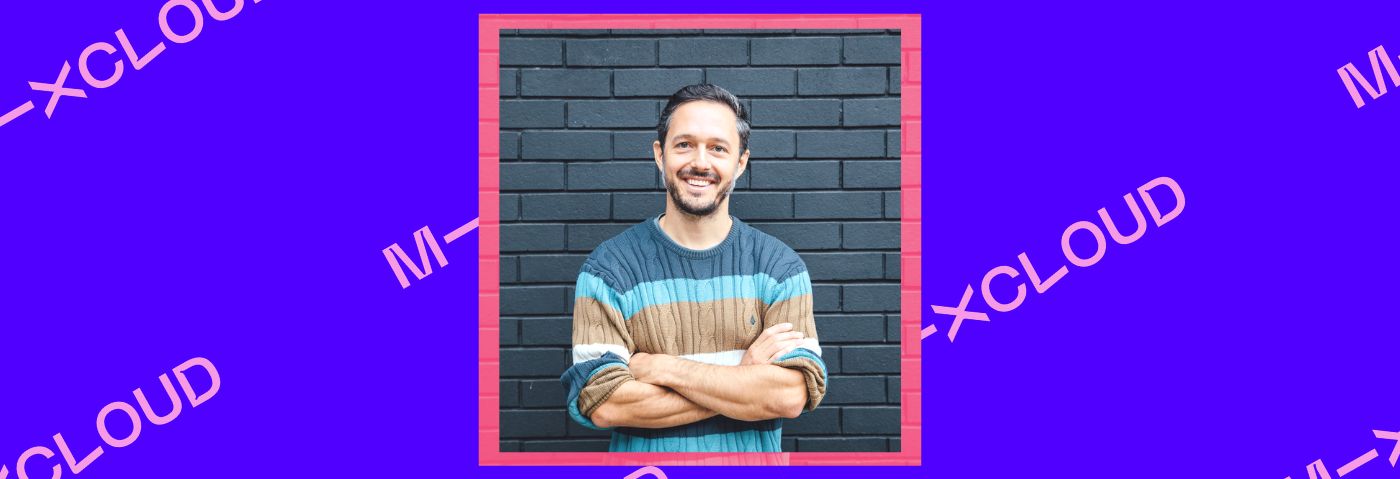At the end of last year, Mixcloud announced a big update to allow track uploads. As the company continues to morph within the everchanging musical landscape, we sat with co-founder Nico Perez to ask how they do it.
In Aesop’s popular hare and tortoise fable, the moral lesson is clear. The hare, supremely confident of winning, stops during the race and sleeps. Meanwhile, the tortoise, moves slowly but purposefully, without stopping and finally wins the race. The careless hare was, as the old adage goes, ‘caught napping’. In short, you can be more successful doing things slowly and steadily than by acting quickly or carelessly.
It pays to keep the Greek story in mind when considering the music companies that have come to dominate the streaming landscape. Spotify, Soundcloud, Twitch, and even (gulp) Meta have all achieved powerful market share in less than a decade. They’re the hares. It’s been a chaotic rush to reinvent the digital music streaming landscape with lots of important topics, namely copyright protection, often overlooked. “Move fast and break things” and all that.
Meanwhile, Mixcloud, which occupies the same digital space, has been on a separate trajectory. Steady and assured in their mission. And the mission has been to “solve rather than break” with license and copyright agreements at the forefront. With those issues resolved, and takedowns avoided what next for the company that’s unique it’s in its proposition?

As I joined my call with Nico Perez, co-founder of Mixcloud, I was pleasantly surprised to see him appear on time. “It’s just a common courtesy,” he says joining from the US. “I try my best to give people the respect they deserve if they’ve going to take the time to speak to me”.
The punctuality is impressive given his in-tray must be unscalable. Mixcloud recently made another somewhat radical update in allowing original single-track upload to the site. It takes the firm into new territory and when a platform is as large as they are, it’s rarely, if ever straightforward. How come, after fourteen years, did they decide to roll it out now? “Our modus operandi originally was to solve this copyright challenge that everybody faces and figure out how to clear copyrights for DJ mixes, radio shows, podcasts with music etc. We’ve broadly solved that problem so this came next”.
While that has happened, and Mixcloud stands alone in navigating the dizzy world of license contracts with a huge array of stakeholders, the DJ landscape has changed. DJs listed, in the often maligned DJ Mag Top 100, when published in the 90s were only DJs. In other words, only a small percentage were also producers.
Fast forward to today and nearly all DJs, in the Top 100, are also producers. If DJs and producers are no longer mutually exclusive, the demand grew for Mixcloud, whose main users are DJs, to provide track uploads.
As the line between DJs and producers blurs further, we’re responding to the community demand - similar to when Mixcloud introduced livestreaming during the pandemic in response to the lockdown.
“It’s true and it aligns with our own studies. I think our sweet spot is definitely in between dance music and hip-hop. Within both, there’s so much crossover these days between people who are both DJs and producers. As the line between DJs and producers blurs further, we’re responding to the community demand – similar to when Mixcloud introduced livestreaming during the pandemic in response to the lockdown”.
As is now a rite of passage in any music interview, Web3 rears its divisive head. The early growth of Web3 is reminiscent of the birth of streaming and social media some 15-20 years. The threatened landscape at the time quickly crumbled as new business models took hold. The industry was changing and changing fast. Sponsorship was propelled in response to diminishing record sales as artists and labels looked for further income streams.
Whereas in popular musics’ nascent years, it would be a ‘sell out’ to have a sponsor, in today’s climate you’ve not really made it till you’re spouting the virtues of an alcoholic or energy drink to your fans. It’s a hell of a change, in some part from a necessity, and Web3 will inevitably stir the musical cocktail further. To that end, Web3 solutions are surely seeping through the Mixcloud Slack channels?
“Yeah, that’s definitely a topic that we’ve discussed internally, but I think the jury is still out on Web3. Most of the Web3 music initiatives, as far as I can see, have mostly ignored copyright questions. I do appreciate the efforts to connect artists and fans better. It’s a similar objective to our mission at Mixcloud which we’ve actually recently been looking at.’”

Perez continues: “To a large extent, I think the copyright clearance challenge was definitely a prominent part of the conversation. But with that solved, we realised our other strength is that Mixcloud is great at connecting people through music. In our soul searching, we’re in the process of updating our mission and values. It promises to be something much closer to connecting people through music because other platforms aren’t doing that. There will be more social tools for users”.
Often founders and companies get criticised. Once you get to a certain position the target increases and thus becomes easier to hit. Mixcloud is no different and with recent amendments they’ve made decisions that have not always been popular. One of those was in December last year when Mixcloud introduced DJ mix limits affecting the creators. Amidst a slew of benefits, users could only have 10 mixes/published shows on the platform before having to upgrade. Old mixes will still be available, and it’s only if a user wants to continue uploading more that they would need to choose between upgrading or removing published shows/mixes.
Perez explains his position “I think I’d say first that I understand the frustration. People have invested a lot of time and energy and in some cases uploaded dozens or even hundreds of mixes and radio shows. But Mixcloud is a licensed platform and we do care about copyright. However, those copyrights need royalty payments which is a cost that has been growing steadily over the years. It’s got to the point where we can’t subsidize everybody’s costs for those royalties. With our calculations, we noticed we could do it for free but only up to 10 mixes, radio shows etc. After that, we need people to chip in, and upgraded Pro accounts help cover the costs that are associated with music. I do really want to stress and clarify that it is only going forward. So let’s say, for example, that you’ve uploaded 50 mixes. It is only if you want to keep uploading that there will be a charge.”

Across the internet, it does appear the age of ‘freemium’ models is ending. If Musk is going to keep sending people into space he wants you to pay for Twitter to help fund it. If Zuckerburg is going to keep meddling in elections, then you’re going to have to pay for that dubious privilege. Most mainstream media are now behind a paywall of some description. It’s the natural evolution as internet business models mature.
With Mixcloud it’s worth remembering that increased licences equate to more revenue for musicians. In short, a net benefit for us all. It’s not as if the biggest player in the room, Spotify, has a great track record in this regard. Something would always have to give and over the past five years, the company has moved to monetise its’ sizable audience on the creator and listener side. It can’t be free forever. No one wants to make difficult decisions so how much of what Mixcloud does is external versus internal led?
Ultimately, I believe that in the long run, it's better if a music platform is sustainable as it means that it can grow.
“It’s a balance between shareholders, management and our users. A great example is during the lockdown it was super clear that everybody wanted a livestreaming tier to the platform so we rolled it out in response to that. And with the Pro account, you get access to livestreaming and you get to turn on monetization channels. There are a lot of options there. Ultimately, I believe that in the long run, it’s better if a music platform is sustainable as it means that it can grow”.
What do you think people most misunderstand about licensing? “The most common misconception is the idea that if it was for promotional use, then it’s okay to play copyrighted music. We see this a lot and people don’t realize that there are public performance rights. I don’t blame people as there are a lot of layers with different rights and different territories. It’s super complicated!”
As the conversation winds down, I pushed on what might be on the horizon. Given all the changes that are now taking hold, what does a more social-led Mixcloud look like? “It’s a great question. So right now, the chat room is closed in the sense that you have to be on the Mixcloud website to activate it. We’ve had a lot of requests to kind of open it up via API so the chat functionality sits across different livestreaming platforms. So we’re looking at that. You can start to build really cool things if you open it up. There are also discussions around livestream software and interactivity giving the audience great control over the look and feel of the livestream. Mixcloud is the only licensed music platform where you can livestream, share your own original music, and monetize online so we’re looking forward to developing it further”.
Join Mixcloud Pro on their site. Follow Mixcloud on Instagram .
If you want to learn more about royalties read our feature on Understanding Royalties.


